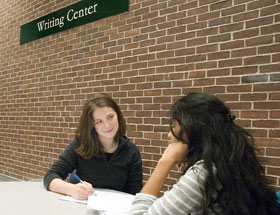  |
| HOME | THIS ISSUE | CALENDAR | GRANTS | BACK ISSUES | < BACK | NEXT > |
Writing Center taking on new tasks by Richard Veilleux - October 16, 2006
|
||||
| Thomas Deans and Kathleen Tonry are both scholars in English, so when they took over the leadership of UConn's Writing Center in September 2005, they faced a problem: How could they help anthropology students write like anthropologists, or engineering students like engineers? The answer was easy - they couldn't. At least not on their own. As they shaped the Writing Center to meet the challenges of UConn's new writing-intensive requirements across the curriculum, they found that the best answers emerged out of new partnerships with faculty, graduate students, and undergraduates. Writing in the discipline "Part of our job is to listen hard to departments, working with them to create discipline-specific resources for writing." Also high on their to-do list was hiring graduate students from a range of disciplines to work with different departments. This fall, 16 graduate students from 14 different departments came on board. While all the GA's spend some of their time tutoring, Deans and Tonry created a liaison system similar to that practiced at University Libraries, assigning the students specific disciplines to partner with. "We wanted to know 'what do faculty and the teaching assistants need to make their courses as robust as possible?'" says Deans. "Sometimes that means sharing best practices and practical tools, sometimes researching what's being taught, sometimes seeing what other writing programs at other universities are doing. "We want to make the best use of what is out there, but also use our varied staff of graduate students to cultivate our own resources," Deans adds. The undergraduate staff roster is even more diverse, with tutors representing 25 fields of study, from family studies to pharmacy, and kinesiology to chemistry. This kind of academic and intellectual diversity is, they say, a start. Supporting W courses They were charged with developing a writing center that not only helped undergraduates improve their writing skills, but also supported the W portion of the new General Education Requirements, which also took effect in September 2005. Besides freshman English, the new requirements call for all students to take two W courses, with at least one in their major, a regulation that caused some angst among faculty, especially in disciplines that traditionally did not focus on student writing. Deans sent a packet of material to all W course instructors in August. The packet included an explanation of the W requirement, a list of frequently asked questions regarding W courses, another FAQ sheet regarding the Writing Center, a form to be used by faculty who would like a writing center tutor to visit their class and discuss the center, and a list of workshops on teaching W courses being sponsored this semester by the writing center. Deans hopes to offer six workshops each semester. The work has not gone unnoticed.
"The quality of tutoring and support of faculty has increased dramatically, not only in support from the English department, but in their own discipline," says Keith Barker, associate vice provost and director of the Institute for Teaching and Learning, the new home for the Writing Center. For decades, the center had been housed in the English department. Non-writing courses A good example, he says, is the work done by Brigid O'Donnell, a graduate student in the Department of Ecology and Evolutionary Biology who holds a full-time assistantship with the Writing Center. O'Donnell, says Deans, has been working with faculty and students in the department who decided they wanted to emphasize better writing techniques in laboratory reports. Her efforts so far have included a workshop with about 20 biology instructors who teach 100-level labs, and a series of review sessions keyed to scientific writing for students in those labs. "It doesn't matter where the students eventually work, whether in industry or commerce, what they write is a piece of professional communication, and they should know how to do it," says Barker. Adds Deans, "Becoming a proficient writer in your discipline is part and parcel of learning that discipline." Tutoring services The outreach efforts of Deans and Tonry have had positive results, with more than 2,500 students taking advantage of the center's tutoring services last year. Tutoring takes place in the Center for Undergraduate Education; at the site of the earlier Writing Center in the CLAS Building; and in the new learning commons on the second floor of Homer Babbidge Library. There are also writing centers, or learning centers that include a writing component, at the Avery Point, Hartford, Stamford, Waterbury, and Torrington campuses. Some of the undergraduate tutoring is done by the center's graduate assistants, who contribute several hours each week to the effort, in addition to their roles as department liaisons; but much of the load is borne by the center's 34 undergraduate tutors, who emerged from a rigorous hiring process. "A lot of them were nominated by faculty," Tonry says. "We also required a letter of application, a writing sample, and during our interview process we put candidates in small group situations to see how they interacted with people. We ended up with an incredibly talented staff - these students have energy and enthusiasm to go along with their skills as teachers and writers." This fall, the entire staff participated in an orientation session, and the undergraduate tutors continue their training through a tutoring practicum. The center has expanded its hours this year and is now open from 9 a.m. to 10 p.m. Monday through Wednesday; 9 a.m. to 4 p.m. on Thursday; 10 a.m. to 2 p.m. Fridays; and 2 p.m. to 10 p.m. on Sunday. |
| ADVANCE HOME UCONN HOME |

